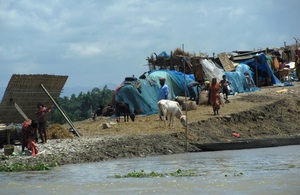DFID Research: Building collaborations between humanitarian programmes and researchers to improve health in a crises
Enhancing Learning and Research for Humanitarian Assistance has launched a new fund which aims to improve research and review the evidence on public health emergencies in low and middle-income countries

Displaced persons staying in temporary camps in Morigaon district, Assam. Picture: Oxfam International
A new research programme that will save lives and reduce suffering in a humanitarian crisis has been launched by Enhancing Learning and Research for Humanitarian Assistance (ELRHA) with support from the Department for International Development and the Wellcome Trust.
The Research for Health in Humanitarian Crises (R2HC) programme aims to increase the quantity and quality of collaborative research on public health challenges in humanitarian crises occurring in low- and middle-income counties.
Evidence on what works in relation to public health in humanitarian crises is limited. There are 2 key reasons for the weak evidence in this area. First, it is challenging, but not impossible, to conduct quality research in humanitarian settings. Second, 3 groups– NGOs, multilateral agencies and academics have traditionally worked separately in this area. This initiative will forge collaborations between these groups to address key research challenges in the humanitarian sector.
The R2HC programme will:
-
Undertake a system-wide evidence review to identify what evidence and gaps exist with relation to public health interventions in humanitarian contexts. This Evidence Review is currently being carried out by a research consortium involving the London School of Hygiene and Tropical Medicine (LSHTM), Harvard University and the Overseas Development Institute (ODI).
-
Facilitate new research collaborations between public health researchers and operational organisations. Research collaborations will address key research questions identified in the Evidence Review.
-
Establish a rapid response facility set aside for pre-approved research projects/consortia to be set up and undertaken in the acute phase of an emergency.
ELRHA will also be hosting a series of regional R2HC Town Hall meetings over June and July 2013 to provide further details of the programme to prospective applicants and to help facilitate researcher and operational organisation collaborations.
Further information on the R2HC programme and how to apply for the Town Hall events and funding is available on the ELRHA website.
Updates to this page
-
Amended title of ELRHA
-
First published.